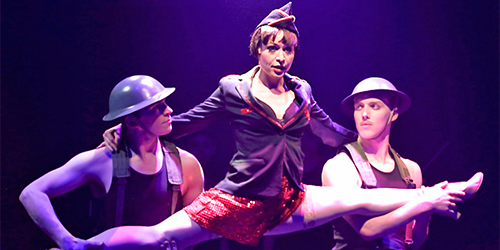By Carolyn Hayes

"Cabaret" continues at Farmers Alley Theatre through June 29. Photo: Farmers Alley
The Germans of the early 1930s had suffered war (and the loss thereof) as well as economic desperation; they were ready for a cause and a champion to unite them in optimism and national pride, and they found one. Anyone with even a fleeting grasp of history knows this is a most generous spin on a power surge that soared to indescribable levels of terror and viciousness. But the musical "Cabaret" (music and lyrics by John Kander and Fred Ebb; book by Joe Masteroff) aims to provide an enticing explanation for the inadvertent complicity of a population. In the production now at Farmers Alley Theatre, director Kathy Mulay leads the denizens of one provocative Berlin nightclub blindly toward the inevitable, but gives in to the hindsight shared by the audience, increasingly hinting at the evils to come.
Protagonist Clifford Bradshaw (Colin Woodside), an insolvent American novelist, arrives in Berlin on the eve of a new year, seeking inspiration. What he finds is the Kit Kat Club, a seedy cabaret infamous for its onstage depravation and offstage extension of sexual freedom and fluidity. There, he meets headliner Sally Bowles (Elizabeth Swearingen), a perennially social English gamine with vague ambitions of stardom – and a sudden, pressing need for a place to live. In a tumult of scenes inside and outside the club, Clifford, Sally and the people surrounding them alternately herald, decry or ignore the encroaching political storm, which increasingly interrupts and stampedes over private lives in service of its "higher" purpose.
For this production, Farmers Alley has reconfigured its seating to be fully in the round, with entrances on all sides. It's a challenge especially well met by choreographer Melissa Sparks, who maneuvers a lot of skimpily clad bodies into spinning patterns in the club's splashy, exciting production numbers. Notably, there's a sort of wholesome raciness to the high kicks and pelvic gyrations here, executed with vigor by the athletic octet of Kit Kat Girls and Boys; wiggling in hot pants notwithstanding, this feels a little more like a dance troupe than a herd of try-anything degenerates in the sex trade. The clean, pretty, sufficient-coverage costumes by Elaine Kauffman confirm that this is not aspiring to be the raunchiest, most incendiary "Cabaret" around. Similarly, while the close quarters allow the club's impish Master of Ceremonies (Adam F. Carter) to banter readily with the audience, he does so with measured, non-confrontational panache.
Given the puzzle of an empty space and no back wall, scenic designer W. Douglas Blickle configures a handful of lightweight, easy-moving furniture pieces and doorways into countless scenarios that never impede the view. (Also visible are strategically placed television monitors showing offstage conductor and co-music director Cynthia Hunter, from whom the actors take their cues – not a perfect solution, but one that plainly helps to optimize a sophisticated sound design by Les Batts and show off the array of vocal talent.) The transitions are blindingly efficient, helping this long show move along briskly, and even making room for a generous allotment of properties, which make a veritable grocer of designer Tony Holewinski.
The single, malleable space also makes it possible for Mulay to introduce unconventional conceptual choices that push the unspoken Adolf Hitler and his oncoming reign toward the foreground. This leads to a dissonant blend of the furtive, seeming safety of "in here" with the unrestricted ominousness of "out there"; additionally, lighting designer Lanford J. Potts lends dramatic flourishes to scenes outside the club as well as in, maximizing the overlapping hubbub. These bold interpretations add dark underlines to the intimations of the scripted fare, and even an exclamation point or two, trumpeting the broad-strokes progress of this community from goosing to goose-stepping.
Critically, the obviousness of the impending moral atrocity requires the characters to be willfully ignorant to the point of complete self-involvement. This is most poorly homed in the grim Swearingen, whose unmatched selfishness calls into question how she ingratiates herself to anyone, let alone lives off of others' good graces. Opposite the smiling blankness of Woodside's observant spectator, the central duo seems to find each other chemically and physically repellent, distancing themselves from each other as vehemently as they do from what Germany is becoming. On the other side of the coin, the clowning Carter grows increasingly malevolent, unleashing asides of winking condemnation and apparent omniscience that mark him as a mouthpiece for the director's foreboding intent.
In point of fact, the pinnacle of the production concerns people interacting not with the political landscape, but primarily with each other. In Barbara Marineau (as the aging landlady Fraulein Schneider) and Dirk Lumbard (as the widower and German Jew Herr Schultz), the show delivers a sparkling romance, reveling in the joyous highs of life and love proceeding despite the outside world, and lamenting the pitiful, tragic lows beyond their control. The actors play and sing together with exuberance, even as they make heartfelt decisions based on the information available, as well as their own experience and flawed convictions. Theirs is the most touching story arc on the basis of its gentle humanity, but the exceptional performances and touches of sweet humor lend it stratospheric impact.
This "Cabaret" aims to clearly track the descent of everyday German people – the upstanding and decent, as well as the fringe and degenerate – into the innocuous trap of Nazism and the abominations that followed. The production's subtext is overt, its condemnation clear. The musically decadent show delivers on its promise of nightclub pizazz and titillation, but the viewer is not permitted to slip into pure escapism, as the deadly historical endgame is always lurking at the periphery.
REVIEW:
'Cabaret'
Farmers Alley Theatre, 221 Farmers Alley, Kalamazoo. 8 p.m. Thursday-Saturday & 2 p.m. Sunday through June 29. 2 hours, 40 minutes. $33-35. 269-343-2727. http://www.farmersalleytheatre.com










